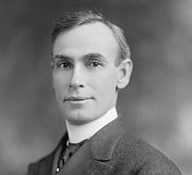
Following is the first part of a story series by contributor Brent Engel.
Pike politician’s dirty campaign results in good
It’s an idea that today would likely induce convulsive laughter or at least hearty scoffs.
But in 1913, Pike County native and Missouri Gov. Elliot Woolfolk Major issued the kind of challenge that could not be ignored.
Missouri’s thoroughfares were atrocious, and Major was determined to solve the problem. So, he proclaimed Wednesday and Thursday, Aug. 20 and 21, as “Good Roads Days.”
Business people, farmers, government employees, housewives and just about every other able-bodied person in the state was recruited.
Stores were asked to close so that workers could participate. Counties, cities and townships helped to coordinate the work. The timing couldn’t have been more perfect.
Major had been sworn in just six months earlier, and had an ambitious agenda for improving his beloved state. His “Good Roads” proclamation came four months after lawmakers created the Missouri Highway Department.
As the world careened toward what would become war, Major used military terms to inspire Missourians.
“This will bring to the roads of Missouri for work an army of labor volunteers, grander far than the brilliant pageantry of martial splendor, and whose song of progressive achievement will be sweeter than the rattle of arms,” he said.
When it came to rutted routes and lousy lanes, Major knew what he was talking about. And, instead of drawing ridicule, “Good Roads Days” was a notion that would gain attention far beyond Missouri.
Leadership was in Major’s blood. A distant relative of Presidents James Madison and Zachary Taylor, he was born on a farm near Edgewood on Oct. 24, 1864.
Major attended Watson Seminary in Ashley and began a career as a teacher in 1884, but left to work in Champ Clark’s Bowling Green law office.
At 21, he was admitted to the bar and later served as Clark’s law clerk. Major spent three years in the Missouri Senate before being elected attorney general in 1908. He would argue more than 1,000 cases before the state Supreme Court and 52 at the U.S. Supreme Court.
In 1912 — the same year Clark ran unsuccessfully for the Democrat presidential nomination — Major defeated another Northeast Missouri resident, Republican lawyer and Lt. Gov. John C. McKinley of Putnam County, for Missouri governor. Roads were a major theme of his 1913 inaugural address.
“They constitute the strongest link in the chain of commercial greatness, and are the first evidence of commercial progress,” Major said.
The governor called himself a “plain Missourian, reared in the simplicity of country life” but “experienced in the affairs of the state.” He promised “good, clean, wholesome progress.”
Many thought Missouri needed it. For decades, highways were funded from local taxes or tolls. Early on, companies were formed to oversee construction or ownership.
Of Missouri’s 114 counties, Pike was in the top four for toll roads. Major was part of the effort to change that, and he would soon be joined by another Pike County native in setting the course.
Next time: Getting to work.